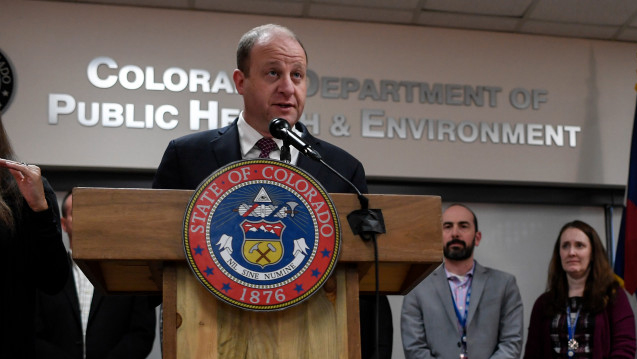Primum non nocere.
Translation: first, do no harm. It’s a phrase that has been part of the medical ethics lexicon since the 17th century.
Coloradans would have been wise to apply it to energy policy some two decades ago, when the eco-left began politicizing energy production, electricity, and our grid.
Flanked by low-income customers, Governor Jared Polis recently ordered “all hands-on deck” to address skyrocketing utility bills. The Governors’ prescription for low-income customers? Even higher utility bills.
Tragically, Polis keeps lying to his patients: “The truth is renewable energy lowers cost. The sooner we can move off high-cost coal energy and volatile natural gas energy, the sooner we can pass these savings along to consumers.”
If Dr. Polis’s goal is to keep the heat on in winter, then everyone should start saving now for even higher bills as he continues the state’s forced march toward 100 percent unreliable, intermittent, mother nature-dependent wind and solar.
It is true that higher natural gas commodity prices have impacted utility bills. But this is largely a problem of the Polis’s own making, aided and abetted by his allies in the state and federal governments. Government agencies such as the Colorado Department of Public Health and Environment (CDPHE) and the Environmental Protection Agency are doing their best to eliminate natural gas development. In basic economic terms, it’s a supply and demand issue.
Yet despite these efforts, it is still cheaper to heat your home in Colorado with gas versus electric heat – 25 percent cheaper. Don’t believe it? Check out this report by a left-leaning organization, which found that natural gas is the most affordable way to heat your home in 43 of the 50 states, including Colorado. The other seven states are nearly all warm-climate states—unlike Colorado—with the exception of Wyoming, which has cheap electric rates because its state government hasn’t intentionally driven them up with costly green policy mandates.
A 2019 Independence Institute report found that the cost of reorganizing the way Colorado is powered – 100 percent wind, solar, and batteries – could be nearly $120,000 for every man, woman, and child or close to a half million dollars – $480,000 – for a family of four.
And now, Polis and his ivory tower Public Utilities Commission want to pile on by forcing you to give up your gas stoves and gas furnaces in favor of all-electric homes. As mentioned above, expect to pay 25 percent more on your bill to heat your home. So, your already sky-high $400/month heating bill just went to $500, costing you an extra $1,200 per year. And that doesn’t include the conversion cost of ripping out your gas furnace and replacing it with an electric heat pump, which will run you around $22,000. If it’s a new home, the extra cost to make your house all-electric will be about $100,000, according to the Home Builders Association.
That may be pocket change for our centimillionaire Governor and his hand-picked, rubber stamp PUC Commissioners who live in tony places like Edwards and Boulder. But most average or low-income Coloradans can’t afford that.
(Side note: according to sources, Colorado’s PUC commissioners can’t be bothered to show up in person to the PUC offices. While many of the rest of us are working in person, our commissioners don’t want to come to Denver to face the people they enjoy regulating.)
As Colorado’s rates continue to climb, we are beginning to look more like California and Germany, two places that embrace renewable energy more than anywhere else and suffer rates multiple times higher than places not freebasing on unrecyclable solar panels and collapsing wind towers.
Despite what former State Rep Max Tyler (D-Lakewood), who “chuckles” at being wrong, says, “free” wind and solar are expensive because they must be backed up by reliable power. In Colorado, that means natural gas-fired power because the state ignores nuclear. The costs of those intermittent sources are added to those backup plants, which are used less but still have the same fixed cost. Voila, the same amount of power at twice the expense! That’s what Polis and his renewable sycophants aren’t telling you.
Unlike average Coloradans, Polis et al. don’t place any value on reliability.
Why is reliability so important? Check out this Twitter thread from Jake Fogleman, Independence Institute’s energy policy analyst, showing which resources were workhorses this January when Coloradans needed power the most. Give yourself a gold star if you said fossil fuels!
The open secret is industrial wind and utility-scale solar aren’t always reliable, as we’ve said repeatedly. They especially struggle when the temperatures get super cold – when you need power most to survive.
Dr. Polis, heal thyself. Stop blaming natural gas prices while you are siccing the CDPHE on producers to artificially limit gas supply. And stop prescribing higher-cost renewables that will leave us to freeze in the dark.









